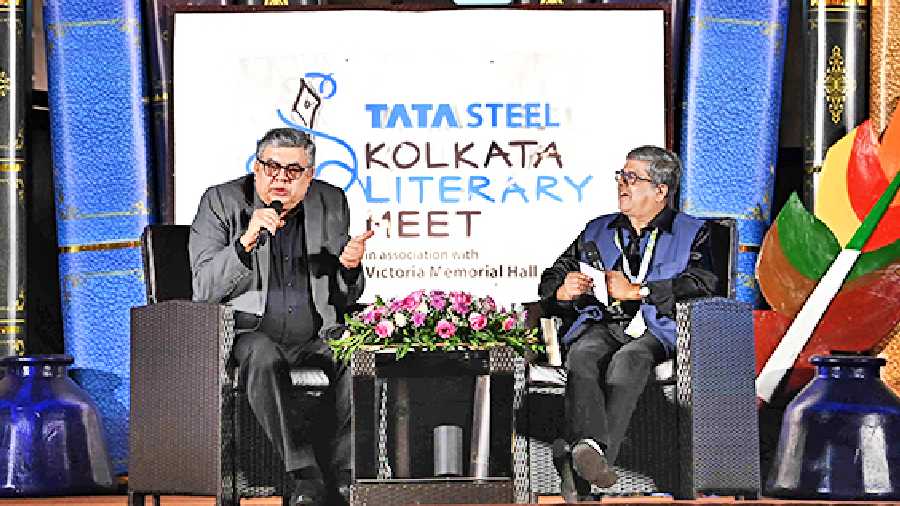In 1932, at the Olympics, there was a substitute goalkeeper in the Indian hockey team, an Anglo-Indian called Arthur Hind. Since he refused to wear a turban at the opening ceremony, which was part of the official clothing, he was to be sent home immediately. But after an apology, he was allowed to participate.
Cut to 16 years later, Olympic Games 1948. Leslie Claudius, another Anglo-Indian, writes how emotional he was when the Tricolour went up, and the new Indian national anthem was being played.
The two stories sum up the evolution of the Anglo-Indian community in India.
Barry O’Brien, ace quizmaster, educationist and one of India’s most sought-after master of ceremonies, discussed his new book, The Anglo Indians: A Portrait of a Community, at Day Three of Tata Steel Kolkata Literary Meet on Monday.
The book tells the social, cultural, and political history of the Anglo-Indians in India.
O’Brien was in conversation with S.V. Raman, a cultural curator and programme consultant at the Victoria Memorial Hall. Ruskin Bond, described by O’Brien as the “greatest living Anglo-Indian”, joined in virtually from Landour, Mussoorie, for a while.
Excerpts from the conversation
An Anglo-Indian is
One must be of European descent from one’s father’s side to be an Anglo-India, O’Brien said. “Whether it is right or wrong, we will have a cup of tea and discuss. Number two, you must be a resident of India,” he said.
Not by chance
The community did not happen by happenstance, said O’Brien. The community was created for the colonisers to help in trade and communication. “They couldn’t keep bringing all their people over here, it would be very expensive, difficult. So here was a community being created by them for the purpose of easier trade and communication....”
With love, from Bond
Barry O’Brien dedicated the book as a gurudakshina to the greatest living Anglo-Indian and one of the greatest Anglo-Indians of all time, Ruskin Bond.
“I grew up in an Anglo-Indian family which actually represented many parts of the country. My father was born in Shahjahanpur in UP, his brothers were born in Barrackpore, Chittagong and Jabalpur. It shows how the Anglo-Indian community was an all-Indian community...,” said Bond.
Of the book, Bond had this to say: “For history, it is a very readable book. Sometimes, histories of communities or countries can be very dull. I have enjoyed reading the book. Not a boring one, it is full of anecdotes”.
He sent O’Brien a handwritten note of praise after reading the book. More than once on Monday, O’Brien said he wished to carry it to his grave.
Evolving identity
The time of Independence was fraught with uncertainties for the community. Many Anglo-Indians chose to leave India. But many stayed back and in a decade or two, “the community had completely, voluntarily, changed its identity and said ‘hang on, we are Indians’,” said O’Brien.
It was then that he shared the hockey anecdotes.
“It is not a big deal now. But imagine, a hundred years ago, it was a big issue. Because they were in the police. The British were very clever. All these things with the danda, they gave the Anglo-Indians. They were on the streets, handling law and order. When the British were going away, the Anglo-Indians were wondering if the Indians were now going to come after them,” he said.
Everest moment
The community was known for shining in the services and sports. But many did not place the required emphasis on a solid education, said O’Brien. The change started in the 80s.
“Post the 80s, the sole focus of the community has been the education of our children. That has transformed the community. I am saying this as not just the writer of this book but as the president-in-chief of the All-India Anglo-Indian Association, that the Everest moment of our community is around the corner. The dropout rate is really low. Our boys and girls are finishing school, going to college, further beyond that. It has happened for the first time in the past 30 years,” said O’Brien.
